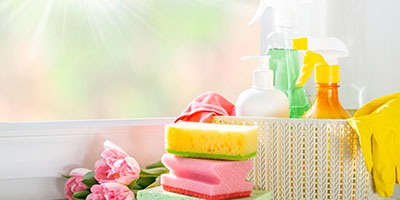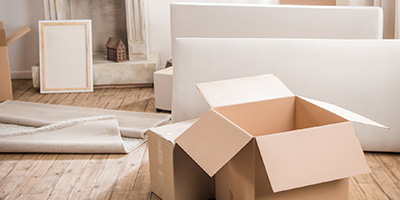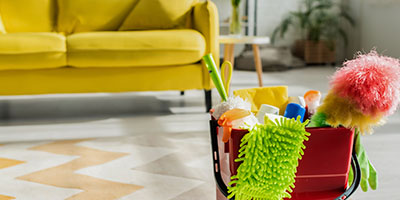How to Deep Clean Your House

The Complete Deep Cleaning Checklist for Your House
Life gets hectic, and while you’re busy living it, dirt and clutter build up quickly. Take a timeout to clean and get organized as the seasons change, and keep your house in tip-top shape all year. You can tackle one room a day or knock out your whole house in a weekend.
What Does It Mean to Deep Clean Your Home?
Deep cleaning your home means thoroughly cleaning every room in your house. This goes beyond simply vacuuming, dusting and wiping down surfaces. When deep cleaning your house, you’ll wash furniture and walls, clean windows and scrub baseboards.
Why? The goal of deep cleaning is to get rid of germs, dirt and harmful bacteria in your house. There are many reasons to keep your home clean. Deep cleaning will not only help keep your home clean and organized for visitors, it will also improve air quality, better your health and reduce stress.

“There is a big distinction between cleaning, sanitizing and disinfecting.
- Cleaning involves removing unwanted contaminants, such as soil, dirt and grease, from a surface, material or your hands. It’s usually what you’re doing when washing with soap and water.
- Sanitizing reduces the number of germs on the surface to levels considered safe as determined by public health codes or regulations.
- Disinfecting irreversibly inactivates pathogens that cause infections and disease like bacteria, viruses and fungi.
The best way to reduce the spread of germs, especially if someone in the home is ill, is to clean and disinfect.”
Natalie D’Apolito, Communications and Outreach Coordinator, American Cleaning Institute
How Often Should You Deep Clean Your House?
It’s important to deep clean your house when you first move in and at least once a year after that. Many people choose to tackle this task during spring cleaning, but you can deep clean your home any time of year. Ideally, follow these deep cleaning tips each season — the more often you clean, the easier it becomes!

“Adopting a regular cleaning schedule can help you keep up with daily messes and keep things like dust and other allergens at bay. In general, deep cleaning when the seasons change gives you an opportunity to take stock of your clutter and donate or throw away items you no longer need, while also getting into the nooks and crannies that may be missed during your regular cleaning schedule.”
Natalie D’Apolito, Communications and Outreach Coordinator, American Cleaning Institute
What Do I Need to Deep Clean My House?
Before we jump into how to deep clean your home, let’s cover all the supplies you’ll need for effective cleaning:
- Rubber gloves
- All-purpose cleaner
- Glass cleaner
- Baking soda
- White vinegar
- Dish soap
- Sponge
- Scrub brush
- Detail brush or old toothbrush
- Squeegee
- Plastic bucket
- Spray bottle
- Microfiber cloths
- Cleaning cloths
- Vacuum
- Mop
- Broom
- Duster
- Bathroom cleaner
- Stainless steel cleaner
Deep Cleaning Tips for Every Part of Your House
Now the fun begins! Learn how to deep clean your house from top to bottom with our room-by-room checklist.

“Deep cleaning can feel overwhelming. Make a plan so that you can tackle your cleaning checklist quickly, all at once or in smaller chunks of time so that you feel better prepared to take on deep cleaning your home.”
Natalie D’Apolito, Communications and Outreach Coordinator, American Cleaning Institute
Your Deep Cleaning Checklist
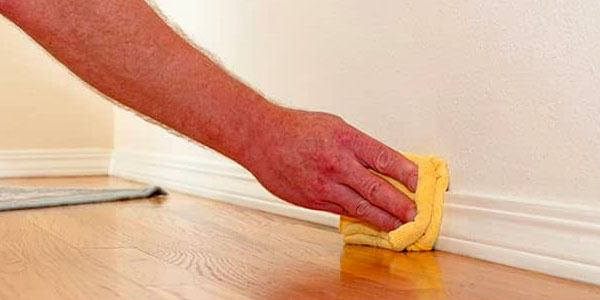
Important Areas to Clean in Every Room
There are tough spots to clean in every room of your house. As you go through your deep cleaning checklist, don’t forget to cover these areas.
1. Dust Ceiling Corners
No matter how high your ceilings are, this is a hard-to-reach spot. We recommend using an extendable duster so you don’t have to worry about using a step stool or ladder. If you notice mold on your ceiling, create a cleaning solution using equal parts water and white vinegar. Spray the area and wait several minutes before scrubbing.

Deep Cleaning Tip
No matter which room you’re tackling, be sure to clean from top to bottom. Dust your ceiling corners first in each room, and clean your floors and baseboards last.
2. Scrub Baseboards
Baseboards, especially in your kitchen and entryways, accumulate a lot of dirt or food splatter. To clean, create a solution of warm water and a few drops of dish soap. Use a sponge or cloth to wipe down your baseboards in sections. Be sure to wipe each section completely dry before moving onto the next to avoid water damage.
3. Dust and Clean Ceiling Fans
Keeping your fans clean helps them cool your home more efficiently.
- Before you clean your ceiling fan, be sure to turn it off.
- Then, dust each blade with a duster or cloth.
- After dusting, clean the blades with a moist cloth using warm water and dish soap.
- Make sure to use a light amount of cleaning solution and don’t apply too much pressure on the blades.
- When you finish, thoroughly dry each blade before using your fan again.
4. Clean Air Conditioner Vents
A lot of dust and dirt gets trapped in your vents. Cleaning your A/C vents will help improve the air quality in your home. To clean:
- Remove the vents with a screwdriver.
- Dust your vents and vacuum your air ducts — but be sure not to go too far in your ducts. Simply vacuum around the outside to get lingering dust and dirt from around your vents. You’ll need an HVAC professional to help if you want to fully clean out your ducts.
- Once you’ve dusted your vents, bring them to the bathtub to wash them with a combination of warm water and dish soap.
- Soak them for 10 to 15 minutes.
- Then dry them as much as possible before putting them back in place.
5. Scrub and Rinse Tile Grout
Create a grout cleaning mixture of 3/4 cup baking soda, 1/4 cup hydrogen peroxide and 1 tablespoon of dish soap. Apply the mixture to the grout and scrub with a grout brush. When you finish, use a sponge or cloth to rinse and wipe the grout clean.
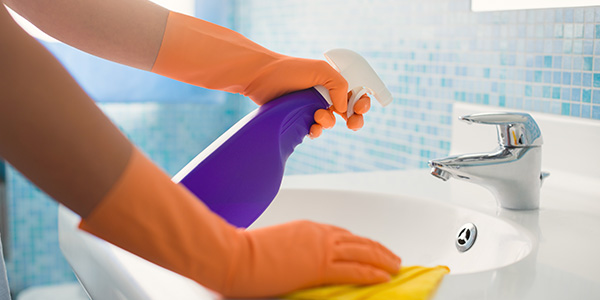
How to Deep Clean a Bathroom
The first room you’ll need to tackle when deep cleaning your house is the bathroom. Bathrooms encounter a lot of traffic, and a lot of germs, so it might take you the longest to clean.

“The kitchen and bathroom are the most important rooms. These are the most used and need to be the most sanitary due to the activities therein.”
Sara San Angelo, Founder, Confessions of a Cleaning Lady
1. Clean the Toilet
Deep clean your toilet by applying castile soap on the sides of the bowl and thoroughly scrubbing with your toilet brush. Flush and let your toilet brush dry before putting it back in its holder to prevent mold growth.
2. Wash Your Towels
Throw all your bath and hand towels into the washing machine, and swap them out for clean ones. This is a good time to take inventory and either throw away or repurpose towels that are worn out.
3. Wipe Down the Mirror
Use your microfiber cloth to dust and wipe down the mirror, light fixtures and bathroom vent. We recommend doing this before cleaning the floors so you can sweep up any fallen dust.
4. Wash Bath Mats and Shower Curtains
Wash your bath mats and shower curtains according to the manufacturer’s guidelines. If you haven’t replaced your shower curtain liner in the past few months, toss it and get a new one.
5. Scrub the Sink, Tub and Shower
Mix warm water with baking soda until it forms a paste, and use it to scrub your sink, tub and shower with a microfiber cloth. Spray vinegar over the mixture and scrub again, then rinse thoroughly.

Deep Cleaning Tip
Be cautious not to mix bleach-based products with toilet cleaners or products containing ammonia due to the hazardous fumes this creates.
6. Mop the Floor
Use warm water and dish soap to mop your bathroom floor. Make sure to get behind the toilet, in small corners and between the vanity and wall if these areas are reachable.
7. Clean Out Drawers and Cabinets
Clear out and wipe down all drawers and cabinets. Take inventory of what you have, what you need and what can be tossed. While you’re at it, get rid of old and expired products from your medicine cabinet and add storage solutions for toiletries as needed.
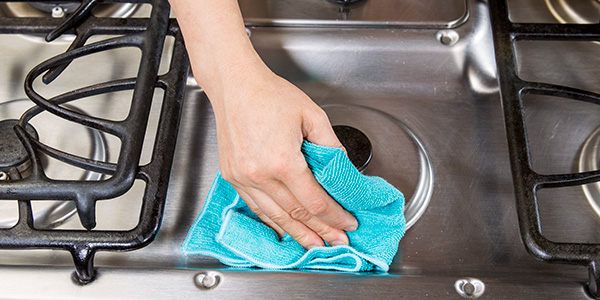
How to Deep Clean a Kitchen
The second room to tackle in your deep cleaning is the kitchen. After the bathroom, the kitchen is a high-maintenance area to clean, since it’s used frequently and bacteria from food can cover many surfaces. Along with your general daily cleaning, tackle these tasks seasonally to keep your kitchen sparkling.
1. Clean Out the Refrigerator
Take everything out of your fridge and freezer, throw away expired or freezer-burned food and wipe down all the shelves and drawers. Pull the refrigerator away from the wall to wipe down the top and sides and sweep behind the appliance.
2. Disinfect the Countertops
After clearing junk off your countertops wipe down the counters and backsplash with an all-purpose cleaner, or a granite cleaner if you have stone tiles. Scrub any grout with warm water and a stiff-bristled toothbrush. You can also add some baking soda to the water for extra cleaning power.
3. Soak the Garbage Disposal
Pour 1/2 cup of baking soda and 1/2 cup of vinegar down your garbage disposal to eliminate lingering odors, and plug it with a drain plug. After a few minutes, remove the stopper and rinse the mixture with hot water.
4. Wipe Down the Stove and Microwave
Take the tray out of your microwave and wash it in the sink with dish soap and warm water. Wipe down the inside and outside of the microwave with warm, soapy water.
Remove the burner grates and caps from your stovetop, and wipe them down. If the grates are extra greasy, let them soak in a mixture of warm water, vinegar and baking soda for 20 minutes before wiping them down with a sponge.

Deep Cleaning Tip
If old food splatters won’t budge, put a wet paper towel in the microwave for 20 seconds to steam the sides and make it easier to wipe away the buildup.
5. Clean the Oven
Run your oven’s self-clean cycle if it has one. It’s important to note that this will only work if the oven is moderately dirty. Otherwise, this can lead to smoke and potentially even start a fire. If your oven has a lot of buildup or doesn’t have a self-clean function, create a baking soda, water and vinegar solution and use a spray bottle to coat the inside. Let it sit overnight, then scrub the surface thoroughly.
6. Run the Dishwasher on Empty
Clear out your dishwasher’s drain to remove any food particles. Then, place a dishwasher-safe container filled with 1 cup of vinegar inside and run the dishwasher on a regular cycle. Once that cycle is finished, sprinkle baking soda across the bottom of your dishwasher and run it again on a hot water setting.
7. Clear Out Crumbs From the Toaster
Empty your toaster or toaster oven by gently shaking out the crumbs into the garbage can. Then, pull out the crumb tray if you have one and wash grease off the removable trays and racks. Wipe down both the outside and inside with a combination of dish soap and vinegar.
8. Wipe Down the Cabinets, Drawers and Shelves
Empty your cabinets, drawers and shelves. This is a great time to assess what you have, donate items you don’t want and throw away anything that’s broken or missing parts. Wipe down the inside of these areas with a combination of warm water and dish soap.

Deep Cleaning Tip
While your cabinets and drawers are empty, take some time to get things back in order! Learn how to organize junk drawers in 25 minutes or less.
9. Flush the Coffee Maker
Mix equal parts water and vinegar, and run a brew cycle. Once your coffee maker is done brewing, clean all parts thoroughly with dish soap and warm water to remove any remaining vinegar residue.
10. Wash Out the Sink
Clean your sink and sprinkle baking soda all over. Using warm water and dish soap, start scrubbing the sink from the top down so you can work the water toward the drain.
11. Sweep and Mop the Floors
Sweep and wash your floors, making sure to remove all furniture and clean underneath. Use a mixture of mild soap and warm water to mop the floors, then soak up any dampness with a microfiber cloth.
Hold it right there! You decluttered first, right?
Consider decluttering your home before you clean any further!
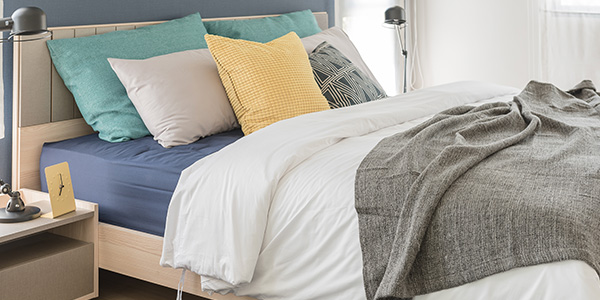
How to Deep Clean a Bedroom
Few things feel better than falling into crisp, clean sheets at the end of a long day, so imagine channeling that clean energy into the rest of your bedroom. While you likely change your sheets regularly, there are many bedroom areas that often get overlooked. Here’s how to get the whole room looking spotless.
1. Wash Sheets and Pillowcases
Strip your bed, and wash the sheets, pillowcases and pillows according to the manufacturer’s guidelines. Take stock of extra sheets and pillowcases in your linen closet. Donate sets you no longer need and throw away items that are torn or stained.

“While deep cleaning, it is a good idea to launder everything you can, from curtains to throw blankets, comforters and duvets. Strip everything down and make a big pile of laundry.”
Sara San Angelo, Founder, Confessions of a Cleaning Lady
2. Clean Your Mattress
Sprinkle baking soda on top of your bare mattress and rub it in with a scrub brush. Wait at least one hour, then vacuum it up to remove lingering odors. This is also the perfect time to evaluate if it’s time to replace your mattress.
3. Vacuum Carpets and Rugs
If your rug is washing machine-safe and small enough to fit, you can vacuum it and run it through a cycle. Lay it flat to dry. If your floor is fully carpeted or your rug is too large, vacuum and use a rug shampoo, warm water and a sponge or soft-bristled brush to clean.
4. Dust Wood Furniture and Fixtures
Dust and wipe down wooden nightstands, dressers, picture frames, lamps, light fixtures and wall art. You can use a microfiber cloth or the hose attachment of your vacuum.
5. Organize Your Closet
Empty your closet and take inventory. You can switch out your clothing based on the season, or go for a full purge and donate what you don’t need or wear anymore. Wipe down the inside, and get your closet organized as you load it back up with the things you’re keeping. This is a great time to declutter nightstands and other bedroom drawers as well.
6. Wash the Windows
Sweep or vacuum the dirt from your bedroom window frames. If the screens look dirty, wash them with soapy water and a soft brush, rinse and let them dry before putting them back in place. Then, clean the inside of your windows using a glass cleaner and microfiber cloth.
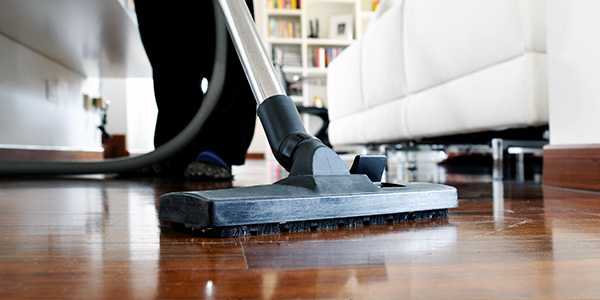
How to Deep Clean a Living Room
While your living room likely gets a lot of tidying up and surface cleaning, there are many sneaky spots where dirt, dust and pet hair can build up that probably need a thorough scrubbing.
1. Wash the Curtains and Drapes
Based on the manufacturer’s guidelines, wash your curtains and drapes. Wipe down all blinds using a cloth dipped in equal parts water and vinegar. If you have wood blinds, give them a good dusting with a microfiber cloth and wipe them down with warm water only, as vinegar can damage the finish.
2. Clean Carpets and Rugs
Vacuum your carpets and rugs.
- If your rug is machine washable and small enough to fit in your washing machine, you can run it through one cycle and lay it flat to dry.
- If your floor is fully carpeted or your rug is too large, use a rug shampoo, warm water and a sponge or soft-bristled brush to clean the surface.
- You can also rent a steam cleaner from your local home improvement store.
3. Dust Wood Furniture
Using a microfiber cloth, wipe down all your wood furniture, mantels, shelves and picture frames. If you or your family suffer from allergies, it might be safer to use your vacuum hose attachment with a high-efficiency particulate air (HEPA) filter, which will capture dust more efficiently.
4. Clean Upholstered Furniture
Start by removing cushions and vacuuming upholstered furniture to get rid of crumbs, dust and pet hair. Check the manufacturer’s guidelines for the best way to clean your furniture. Depending on what type of material it’s made of, there are various ways to clean it without hiring a professional.
5. Dust Light Fixtures
Wipe down and dust your light fixtures with a microfiber cloth. Make sure to test each lightbulb and replace if needed.
7. Wash the Windows
Start by wiping or vacuuming the dirt off your window frame. If the screens look dirty, wash them with warm soapy water and a soft brush, then rinse and let them dry before putting them back in place. Then, clean the inside of your windows with a glass cleaner and microfiber cloth.
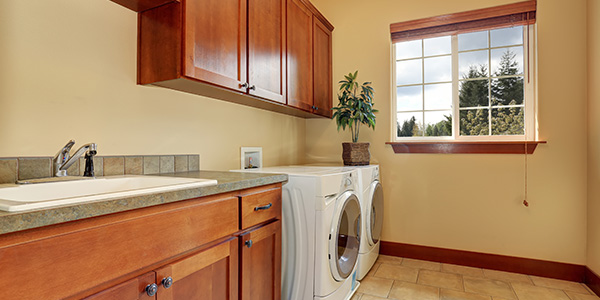
How to Deep Clean a Laundry Room
You use your washer to clean clothes, but when was the last time you cleaned the machine itself? While your laundry room might not see as much traffic as the other rooms in your home, it’s still important to give it a deep clean every few months.
1. Run a Clean Cycle in the Washing Machine
Run your washing machine on a clean cycle with 1 cup of warm water and 1 cup of bleach. Then, run a second cycle using 2 cups of vinegar, 1/4 cup of baking soda and 1/4 cup of water. Wipe down the sides and top of the machine, and wash the soap dispenser once you’re done running the cleaning cycles.
2. Clean the Dryer
Remove and wash your lint trap, and lay it out to dry. Unplug your dryer from the wall, and use your vacuum hose to suck up any lint or debris that’s left inside the trap. Wipe down the sides and top of the dryer before plugging it back in.
3. Restock Supplies
Take inventory of your laundry room needs to restock your detergent, dryer sheets, bleach and other supplies and throw away empty containers. Remove everything from your shelves or cabinets, and wipe them down.
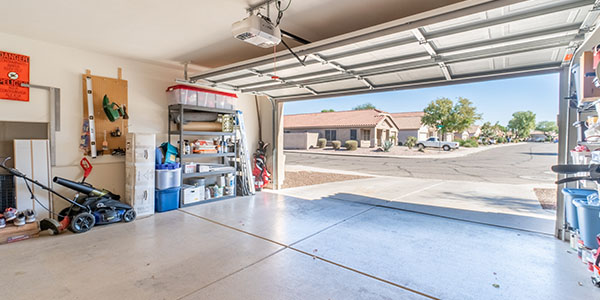
How to Deep Clean a Garage
You don’t realize how much time you spend in your garage, but you’re typically walking through it multiple times a day. Let’s make sure your garage is clean and spotless so you’re not tripping over tools or slipping on spills.
1. Clean Up Spills
Move cars to the driveway, and assess your garage floor. Soak up any oil or car fluid spills using cat litter and sweep thoroughly. If you have time, this is a great opportunity to clean out the garage, give the floor a detailed scrubbing and get the space organized.
2. Remove Cobwebs
Use an extendable duster to remove dust and cobwebs from the ceiling, walls, light fixtures and tall shelves.
3. Wash the Walls
Make a cleaning solution of warm water and dish soap. Use a sponge or cloth to dip in the solution and begin washing your walls in small sections. Be sure to wipe away soap with a clean cloth before moving onto your next area.
3. Vacuum and Mop the Floor
Vacuum lingering dust and dirt from the floor before you begin mopping. Then, mix warm water and dish soap to mop the floor. When you finish mopping, fill your mop bucket with clean water to get rid of soapy residue.
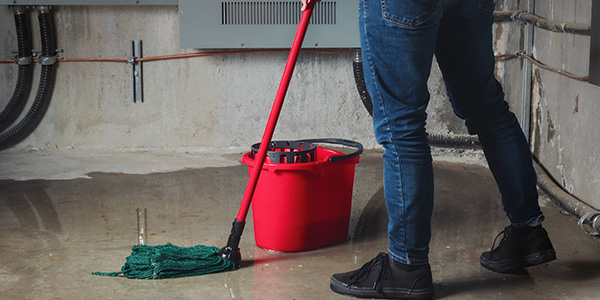
How to Deep Clean Your Basement
Once you’ve deep cleaned the rest of your home, don’t forget about your basement! If you have a finished basement, you’re likely using it as much as the rest of your home, so clean it just as often.
1. Vacuum or Use a Shop Vacuum
If your basement is carpeted, vacuum your floor and be sure to get all the hard-to-reach spots, like behind furniture and shelves. If you have a concrete floor, use a shop vacuum to clean up all the dirt and dust from the floor.
2. Mop the Floor
With concrete floors, it’s important to mop after cleaning up dirt and dust. Mix warm water and dish soap in a bucket and mop the floor in small sections. Then, mop the floor with plain water to remove any soapy residue before drying the floor.
3. Organize Seasonal Decor
Using your basement for storage? From tools and sporting equipment to seasonal decor and toys, the basement serves as a catchall area in many homes. Sort through everything you’re storing in the basement and create an organization system. Donate anything you don’t plan to use again and throw away any broken items.

